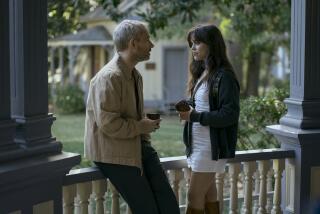‘Girls’ a potent force but it’s hard to love
Toward the end of the first episode of HBO’s “Girls,” Hannah (Lena Dunham), in the hopes of persuading her parents to continue supporting her, hands them the half-dozen pages of the “book” she has been writing for the last two years. To finish this proposed nine-chapter opus, all she wants is $1,100 a month, for two more years.
It’s a wonderful moment, capturing the inevitable divide between generations. With all the gloriously narcissistic conviction of an academically coddled, white, upper-middle-class publishing “intern,” Hannah truly believes she is writing a memoir — she just has to live it first. Her parents, played briefly but brilliantly by Becky Ann Baker and Peter Scolari, can only stare, dumbstruck, hearts full of love perhaps, but also the realization that their daughter now lives in a world light years away from what they consider reality.
![]()
The world of the privileged urban twentysomething.
Like a greenhouse, that world has the illusion of being one with the greater universe but it is a very particular biosphere, small, steamy and fecund. Whether by chance or design “Girls” premieres in what has become television’s official Year of the Woman, joining approximately 157 shows designed to celebrate the power of female bonding and the earthier aspects of feminine sexuality. But while the other shows go wide and laugh-tracked, “Girls” goes micro and all but live.
At 25, Dunham is also the creator and writer of “Girls” and if, career-wise, her own post-college years are radically different from that of her characters, the heady mixture of insecurity and self-righteousness, winsomeness and insensitivity that infuses “Girls” all seem freshly harvested, providing both its undeniable potency and its one real flaw — though wildly smart, “Girls” is a difficult show to love.
Hannah is busy generating her memoir in a surprisingly spacious Brooklyn apartment, which she shares with Marnie (Allison Williams), her best friend and polar opposite. Hannah is sardonic and unemployed; Marnie is controlling and works at a chic art gallery; Hannah insists on having a vaguely masochistic relationship with the emotionally uninterested Adam (Adam Driver), Marnie is bored with Charlie (Christopher Abbott), her loving boyfriend of four years.
They have two other friends to round out the quartet — Jessa (Jemima Kirke), a British free spirit who has just returned from her many international adventures to live with her cousin Shoshanna (Zosia Mamet), a straight-arrow nerd who speaks in dorky abbreviations and uses the characters from”Sex and the City”to define herself.
If the framework of “Girls” is surprisingly traditional, what Dunham layers on top is not. The frankness with which the young women expose themselves, both emotionally and physically, is nothing short of revolutionary.
Many of this year’s female-centric shows too clearly pride themselves on going toe-to-toe with the boys in graphic language and sexual posturing, but at the end of the day, they are all grown-ups doing a little role-playing. “Girls,” on the other hand, reports live from the murk of post-adolescence, a time when everything is both remarkably simple and a perpetual crisis. The sexuality of these “Girls” is truly their own, graphic and far from erotic, played less for humor than to convey a perpetual state of ambivalence: In one particularly disturbing and wonderful scene, Hannah appears just as perplexed by her partner’s dehumanizing sexual fantasy as she is by whether she wants a post-coital Gatorade or not.
She is a coveted creature, the girl on the edge of womanhood, almost as rare as a unicorn and just as difficult to capture on film. Too often infantilized or eroticized, women in their early 20s make people nervous, which is why most shows about these topics skew either nostalgic or older; “Sex and the City,” to which “Girls” certainly owes a debt of gratitude, managed to push the archetype into the peri-menopausal years. But Dunham is no more afraid of herself or her peers than she is of her own body, which is shown in all its non-Hollywood-ideal splendor.
She is also a witty and observant writer, deftly spinning moments of truth and beauty and handing them to her uniformly strong cast, who know just how to wear them. Her dialogue shines over territory familiar (Marnie sighs that she knows Jessa will show up “late, wearing some fabulous blankety dress from a Grecian marketplace and be like ‘oh I can’t remember where I got this’”) and uncharted (Hannah agonizes over how to tonally frame her mention of an abortion.) If occasionally, things go one ironic twist too far — well, you don’t know where the wall is until you bang into it.
Like its main character, “Girls” is, essentially, a memoir in the making, and as recognizable as the characters may be and as powerful as the moments are, it is, in its own way, just as stylized and romanticized as “Sex and the City.” In early episodes, these girls too spend most of their time talking about boys — no one reads a book or sees a play or discusses politics or has a bizarre encounter on the subway. There is a cool cleverness to the show that is both attractive and off-putting; the characters are flawed and hyper-aware of their flaws, the stories so bent on covering every angle of self-examination that there is no real role for the viewer to play.
Which makes watching it an intellectual rather than emotional experience. It is easy to laud the courage and talent behind the piece, to watch with great interest where the show will go, how it will push the artistic boundaries of television. It’s more difficult to care about the characters themselves. Obliviously insular in that small space behind the glass, they are essentially incapable of real connection. Which is, after all, Dunham’s point.
More to Read
The complete guide to home viewing
Get Screen Gab for everything about the TV shows and streaming movies everyone’s talking about.
You may occasionally receive promotional content from the Los Angeles Times.






